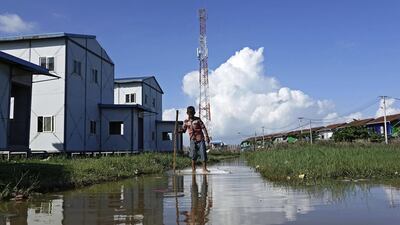Rights groups are alarmed by the Myanmar government’s decision to shut down mobile internet in Rakhine State, where clashes between insurgents and government troops have been escalating.
The mobile internet shutdown, in effect since Friday, affects nine townships. SMS and mobile phone calls are still possible, but secure communications via apps are blocked.
"The shutdown is deeply concerning – not least as it's taking place in an area where access for journalists and humanitarian workers is heavily restricted," Amnesty International researcher on Myanmar Laura Haigh told The National.
Norwegian telecom company Telenor Myanmar, one of three operating in the country, released a statement saying the company has requested further clarification on the rationale for the shutdown, emphasising that “freedom of expression through access to telecoms services should be maintained for humanitarian purposes, especially during times of conflict.”
While the use of social media to inflame tensions and spread disinformation has been singled out by the UN Fact-Finding Mission charged with investigating atrocities in Myanmar, social platforms and messaging apps are critical for documenting and raising awareness of abuses.
“In these kinds of conflicts, civilians and those caught up in the conflict need to access information and this sort of information can often be lifesaving. Shutdowns like these can disproportionately affect civilians,” said Berhan Taye, campaigner at digital rights group Access Now.
An attack on an anchored Myanmar navy vessel 6.5 km north of the Rakhine state capital of Sittwe on Saturday suggests a shift in tactics and capabilities from the Arakan Army, an insurgent group fighting for autonomy for Rakhine Buddhists.
“We attacked them because the navy ships are sending supply rations, ammunition and reinforcements to frontline forces in Minbya, Mrauk U, Kyauktaw, Rathedaung and Buthidaung, where military offensives and heavy fighting [is] taking place,” a spokesperson for the group said, referring to townships in Rakhine.
State media reported a naval ‘tugboat’ was anchored for rescue services and disaster preparedness, and that the military had “beefed up security” in response to the group “carrying out destructive acts ... in an attempt to jeopardise the rule of law”.
The Myanmar army has been locked in conflict with a number of ethnic armed groups – some for decades.
Over 50 civilians have been killed and 400 injured in hostilities in Rakhine this year, according to figures from one civilian on-the-ground network. These include members of both the Rakhine and Rohingya ethnic groups.
In 2016 and 2017, Rakhine State was the site of ethnic cleansing and several genocidal massacres of stateless Rohingya following attacks on security outposts by Rohingya insurgents. At least 6,000 are believed to have been killed, and over 700,000 fled across the border to Bangladesh.
But the current unrest is between the Myanmar military and the Arakan Army. Impoverished Rakhine is home to major infrastructure projects such as China’s CNPC Pipeline and India’s Kaladan Multi-Modal Transit Hub. However, locals see little in the way of flow-on benefits.
The uptick in fighting compounds concerns for civilians, who are now in the thick of the monsoon season. Tens of thousands have been displaced this year, adding to the already-sizeable displaced population consigned to camps since pogroms and communal violence in 2012.
Over 100,000 mostly Rohingya remain internally displaced after widespread violence in 2012. Severe movement restrictions remain in place, which rights groups say has entrenched a system of apartheid.
With media access in the state restricted and local journalists under pressure from the state and insurgents alike, the internet shutdown has dealt a critical blow to the flow of information from and for civilians.
“The military has committed serious abuses, including war crimes, since the fighting with the Arakan Army escalated at the start of this year,” said Amnesty’s Ms Haigh.
“We’ve documented unlawful attacks which have killed and injured civilians, arbitrary arrests, torture and ill-treatment, extrajudicial executions, enforced disappearances and forced labour, all committed with near-total impunity.”

